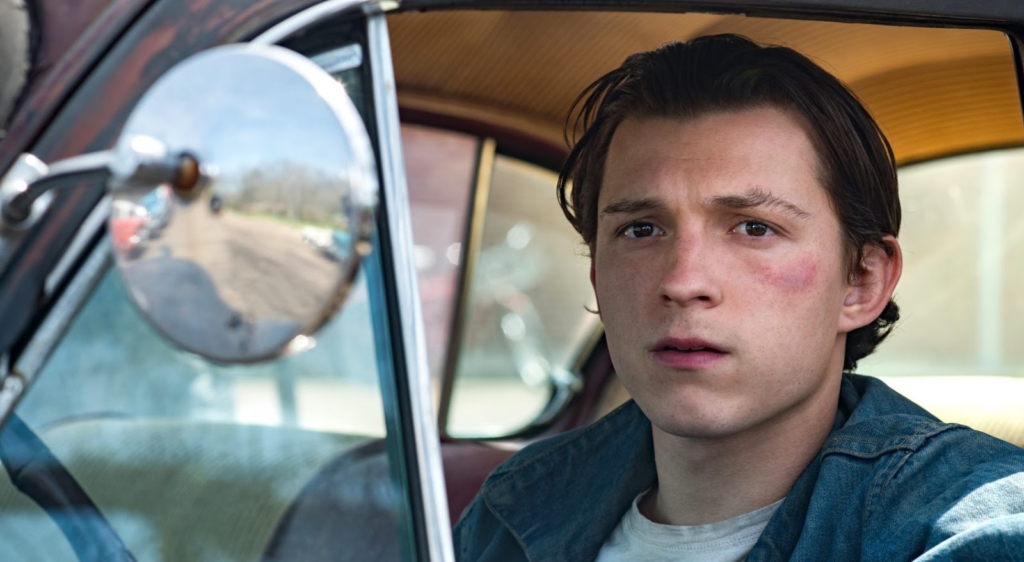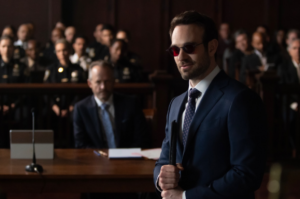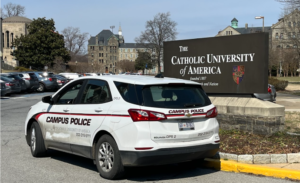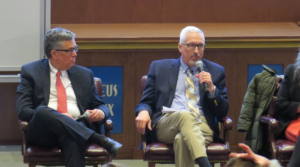New Netflix Original: The Devil All The Time

Image Courtesy of SlashFilm
By Katie Van Lew
In 2018, it was announced that The Devil All The Time, originally a novel written by Donald Ray Pollock, would be adapted into a film featuring stars Tom Holland, Robert Pattinson, and Bill Skarsgård. Although the three seem like an unlikely trio, their performances were astounding, especially since these actors performed roles that were out of the ordinary for them. On September 16, 2020, Netflix released the much anticipated psychological thriller, and since then has earned a seat in the Netflix Top 10.
The first thirty minutes of the film follows the early beginnings of Willard Russell and his family during the 1940s. The movie begins with Willard (Skarsgård) serving as a marine during World War II. After witnessing the inhumanity of the war, Willard turns to a life of devotion and prayer to God to alleviate his sufferings. Upon returning from the war, Willard meets Charlotte, a waitress at a local diner who later becomes his wife. Willard returns home, informing his mother about the waitress at the diner, but his mother is not receptive. Instead, the mother had promised Helen that if her son were to return from war, Willard would gladly marry her. Willard and his mother, along with Helen, go to church on Sunday, where they witness Roy Laferty’s sermon. Roy gives an unsettling sermon, using spiders as a means to show that through God he was able to overcome his fear of spiders. All the churchgoers, except Helen, are mortified by the disturbing spectacle from the pastor. Soon after, Willard goes on to marry Charlotte, the waitress, and Helen marries Roy.
Willard and Charlotte have a son, Arvin. Willard, who has been hardened by the war, teaches his son how to live in a world that is tainted by sin. Frequently, Willard takes his son to a makeshift cross by their country ranch where he teaches Arvin how to pray to God. Aside from governing a life encompassed by faith to God, Willard teaches his son to defend his ground using violence, which contradicts his Christian values.
Amidst their happy life on the ranch, tragedy strikes, leaving Arvin orphaned. As he grows up, he learns more and more about the evil that lurks in his small town. In particular, Arvin learns that evil is disguised in many forms: even in the new, young, and handsome Reverend Preston Teagardin (Pattinson).
Skarsgård’s performance as Willard Russell carries the movie for the first thirty minutes. He is visibly deeply affected by the war, and there is a hardness in his eyes that pervades through the screen into the audience. He is the archetypal, Southern “man of the house,” resorting to fist-fighting to solve problems, and praying to God for forgiveness.
Holland, who is mainly attributed for his performance as the innocent and naive teenaged Spiderman in The Avengers franchise, takes a new form. Holland shines in his performance as Arvin, embodying a no-nonsense teenager who is willing to lay down his life to protect his family, and thus serving justice to those who act contrary to the Christian values that his father had instilled in him. As Holland takes on the position as the man of the house, similar to his father, he finds himself in compromising situations, whether it is beating up bullies or wielding a gun at two serial killers on the run.
Pattinson, often the heartthrob of romantic comedies, transforms into a sinister pastor that abuses his authority in the church. Rarely has Pattinson been portrayed as a villain in a film. Pattinson ditches his usual role as the “good guy” in the film to become a Southern pastor with sinister intentions. Hidden behind a sweet Southern accent, Pattinson becomes the center of chaos and scandal.
The musical score in this film was embedded perfectly. With the film’s timeline taking place between the 1940s and 1960s, composers Danny Bensu and Saunder Jurrisans selected songs that fit the vibe of a small town in the mid-twentieth century. Songs such as “Needles and Pins” by Jackie Deshannon and “Young Love” by Sonny James evokes the film’s sense of nostalgia in a small, rural town.
The Devil All The Time is amazing as it is able to connect the characters of the movie to a recurring theme of abuse of power, as well as the overall theme of evil that runs rampant throughout the small town. The name of the movie, coinciding with the evil that the characters all experience in connection with one another, emphasizes the pervasiveness of wickedness. Author Donald Ray Pollock (also the narrator of the film) created the book to intentionally exploit the corruption of small, rural towns, and the film delivered. The film is not scary in a sense where there are monsters seemingly jumping through the screen, but frightening in the way in which the film makes the audience more aware of the corruption of mankind. The Devil All The Time is essentially a commentary on how evil is not simply an aspect that is attributed to villains in superhero movies, but that evil lives among us.







